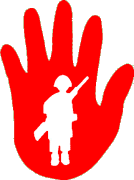International day against the use of child soldiers
The International Day Against the Use of Child Soldiers ( English Red Hand Day ) is an international day of remembrance that is celebrated annually on February 12th to commemorate the fate of children who are forced to fight in wars and armed conflicts. The aim of the day is to call for increased efforts in the fight against this particularly serious form of child abuse. Examples of the massive use of child soldiers can be found in current conflicts in the Congo and Rwanda .
The occasion for this day was the entry into force of the Optional Protocol on the Participation of Children in Armed Conflicts to the UN Convention on the Rights of the Child on February 12, 2002. This additional protocol was approved by the UN General Assembly in May 2000 and signed by 92 countries. A number of national and international organizations actively oppose the recruitment of children as soldiers. These include, for example, the United Nations Children's Fund (UNICEF), Amnesty International , terre des hommes and the International Red Cross and Red Crescent Movement . The efforts of these organizations are under the acronym GDR : Disarmament - disarmament of children, demobilization - discharge from military service and reintegration - reintegration into society.
There are many reasons for using children as soldiers. For example, depending on their age, children cannot fully distinguish between morally right and wrong actions, and between an adventure game and actual reality. Up to a certain age you have no idea of the finality of death, and therefore of the gravity of another person's killing. Children are often unable to correctly identify dangers or adequately assess the risks of a particular situation. They are also easily influenced and enthusiastic about a particular cause or goal. In addition, the use of children as soldiers causes only a fraction of the costs that normally arise for the obligation of adults through wages, food, supplies and other expenses.
A number of rules of international humanitarian law and international human rights conventions apply to the use of children as soldiers . According to the Additional Protocols I and II to the Geneva Conventions , which were passed in 1977, children under the age of 15 should not be recruited into army service or used in combat operations. For persons older than 15 but younger than 18 years of age, the contracting parties should ensure that when they are included in military service, the oldest are affected first. The Optional Protocol to the UN Convention on the Rights of the Child on the Participation of Children in Armed Conflict obliges the signatory states to take all necessary measures to ensure that persons under the age of 18 are not directly involved in combat operations and are not recruited into military service against their will. The the 1999 Convention on the Worst Forms of Child Labor of the International Labor Organization (ILO) of the United Nations called forced recruitment of children for use in armed conflict as one of the worst forms of child labor. Children in the context of this Convention are all persons who are younger than 18 years of age.
Worldwide, the number of child soldiers is estimated at 300,000 (as of 2006).
The use of child soldiers has also led to an increase in the use of anti-personnel mines in many regions , as these are seen as an effective way of preventing the affected children from being used as soldiers due to permanent disability as a result of a mine-related injury.
Every year, many schools in Germany carry out campaigns around the Red Hand Day , in which mostly red handprints are collected from students, which are then given to local politicians.
Web links
- UN Optional Protocol on Children in Armed Conflict (PDF, 19 KiB)
- Coalition to Stop the Use of Child Soldiers - Coalition against the use of child soldiers
- Red Hand Day - Global Red Hand campaign: Children are not used as soldiers

